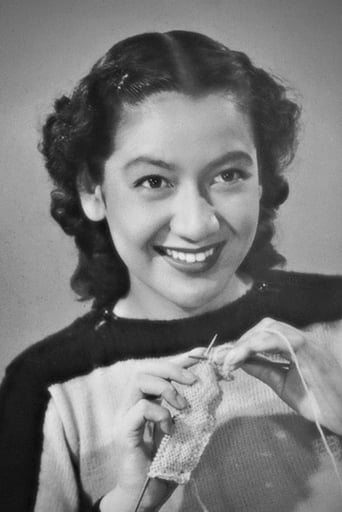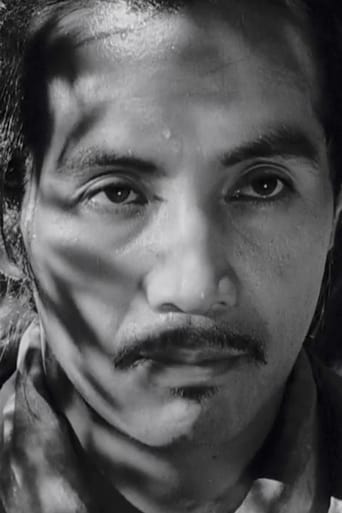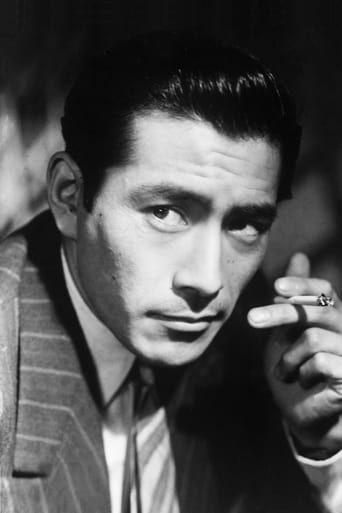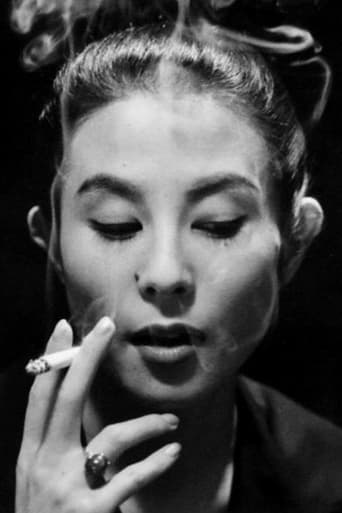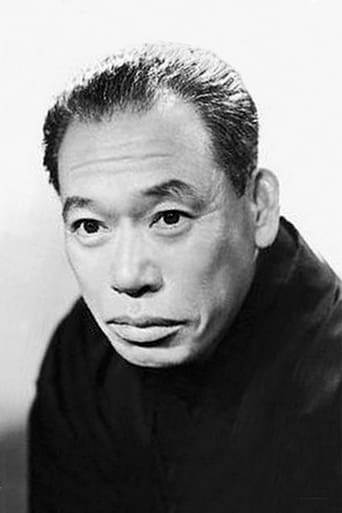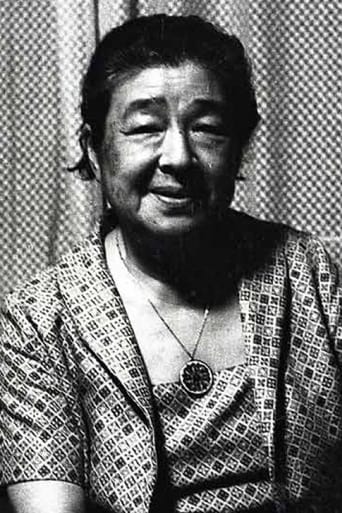ebossert
A Japanese veteran, driven partially mad from the war, travels to a snowy island where he soon enters a love triangle with his best friend and a disgraced woman. Due to severe cuts and editing by the studio, this film includes some intertitles that explain important portions of storyline and character development. Studio cuts aside, I was not impressed with the footage that remained. For example, the drawn out dinner party sequence represents everything I hate about Akira Kurosawa's films. It's like an overdramatic soap opera with utterly confusing character decision-making and completely ridiculous contrivances ("I'd like to announce that Mr. Kameda is the owner of a 125-acre farm.") Give me a break. Other scenes are dry, drawn out, and/or hammy (the "Which of us will it be?" scene near the end is flat-out embarrassing, as is the ending). When Setsuko Hara overacts, you know you're in the presence of an incompetent director. The more I see from Kurosawa, the more he solidifies himself as the most overrated, overpraised director I've ever encountered. It's frankly unbelievable to me how someone with such a dopey, sappy, schmaltzy style of direction is consistently worshipped as a master of masterpieces.
zetes
Yikes! Most of my least favorite Kurosawa flicks before this one were quite a distance above mediocre. I think my least favorite had been Dersu Uzala, which is pretty forgettable, but has its moments (the building of the hut to shield from the wind in particular). The Idiot is by a vast chasm Kurosawa's worst film. Part of this is not his fault. His original cut ran four hours plus, while the studio's released version runs less than three. The story, based on Dostoyevsky's novel, feels chopped to bits. I think I got the gist of it by the end, but it's only barely comprehensible by itself. Perhaps the film stands decently if you've read the source material. However, there is plenty of legitimate criticism of what we do have to justify calling it Kurosawa's worst anyway. This material just doesn't fit Kurosawa's talent. He always has a penchant for melodrama, and that works fairly well in the historical films, as well as his crime films. In fact, in every other film I've seen from him it has worked at least okay. Here, it feels hopelessly misplaced. The set-pieces are so over-performed and even over-directed that they become painful to sit through. Of course, it might help if I knew what the heck was going on. About the only real piece of interest is Ozu's muse Setsuko Hara playing a rather nasty woman, a femme fatale of sorts. It's kind of playing against type, and she does a pretty good job. I can't say I feel the same for Toshiro Mifune, Takashi Shimura, or the film's star, Masayuki Mori.
Myshkin_Karamazov
The Idiot:To me, Dostovesky's book is the Greatest story ever told. Akira Kurosawa adapted his beloved novel when he was at top of his creative prowess. Never fully-released, the film was to remain director's personal favorite for the rest of his life and his magnificent career. Even this vehemently studio-slaughtered cut, which unfortunately is the only version at hand, has retained some of the power, beauty, and, of course, humanity of the Maestro's original vision. Here is to its full recovery and restoration! 8/10
MisterWhiplash
For any adaptation of a Fyodor Dostoyevsky story to work, the filmmaker has got to know what he's in for with the source. Dostoyevsky writes like the sky is falling in every beat, but it's such a breathtaking sky that there needs to be some poetry in the midst of all the torpedoes falling down on consciousness. Getting through Crime and Punishment or Notes From the Underground is hard going at times, but about the most rewarding, if you give yourself to the prose, that literature can provide. I haven't read the Idiot yet, but I can gather just from what I've read about it- and hitherto seen in this Akira Kurosawa adaptation- that it's not a whole lot set apart from his other works. The difference in this case is that there's a more "wholesome" Dostoyevsky character here than, say, Roskolnikov. With a bit of Forrest Gump, a squeeze of Jesus, but a lot more head trauma, Prince Mishkin (here Kinji Kameda) sees the best in people, the love, but also the sadness and pain, and he can't do much but offer some advice and those eyes full of whatever the other person wants to project onto themselves from him.One thing I found really interesting in the Idiot is Kurosawa's use of eyes. Eyes give away a lot sometimes in movies, but in this case they convey almost as much as in a straight silent film. Odd, considering how much Kurosawa sticks to the program of Dostoyevsky's original text (not sure how much it stays true to it, especially translating to 20th century Japan, but it seems close by the tone and depth of the language), that body language and the perspective of eye contact and movement and range is so important. But it's this facet that creates at times the benchmark of the emotion in some scenes, specifically one that takes place late in the film where there's the start of an emotional confrontation between Takeo Nasu and Ayako, the two women of Kameda and Akama's lives, and before a word is spoken in this tense scene where sides are chosen and fates are laid out, eyes go back and forth- Nasu's wild, hurt eyes, and Akayo's more direct, composed orbs. Under any other direction it might go into overacting, but with Kurosawa it's just right.So much has already been written about the problems of the Idiot stemming from the fact that a third of its original running time- from 265 to 166 minutes- detracts from how it really should be perceived. I couldn't agree more, but it should be noted that the picture, when it does work well on the usual fronts of Kurosawa at his prime (and it is often), does have some triumphant status to it. For a movie that, however long length, is filled with this much talk going through motions that should be considered torrid melodrama and to actually surprise one with the effects from its actors and its lucid storytelling, is thrilling. The cast is terrific, everyone from Toshiro Mifune in a role that has him as a kind of "human" time-bomb, where he could go off any minute, but there's a lot of moments where he suddenly comes down to Earth thanks to Kameda; Satsuko Hara, whom we might remember from Rashomon, doesn't stray too far from her character's range, which allows her to plunge head-on into a role that's dark and depressing and strange; and Mori (also in Rashomon and noteworthy in Ugetsu) has a nice quality all around him as the one "innocent" soul of the bunch ("innocent" as in not totally corrupted in his emotions or swayed easily by his passions one way or another).And, as mentioned, Kurosawa's camera is limitless in how it can navigate around during a scene, quietly, sneaking up and getting a good strong composition with everyone in frame a certain way or spinning around to another one, that keeps you on your toes to expect something else. It's suffice to say, at least, his skills don't dull in this time in his career between Rashomon, Ikiru and Seven Samurai. So, really, it all comes down to The Idiot being a piece of a great movie, or pieces to put it that way. It's frustrating, for example, to actually KNOW where the producer cut into the frames, added in a cheap wipe or two- ones that would not be the norm for Kurosawa- and put in those irritating cards early on in the film rushing things along (it also doesn't make sense, for that matter, that the film's first part is 90 minutes while the second is 14 minutes shorter than that equivalent). Like Magnificent Ambersons, Kurosawa got the rough end of the stick on distribution, if to say that he went "too far" in making a 4-hour plus Dostoyevsky adaptation for Japanese audiences in 1951. Unlike Welles, who was an upstart at the comparative time, Kurosawa was just starting out, getting some hits but not quite a superstar in international cinema yet.It's a bit of a shame, because taking in all of the sappy melodrama and the high-rising music and the occasional maudlin touches, The Idiot, in its completed form, could be as great a Kurosawa at his very best. As it is, it's only better than average- but should be a welcome treat for Dostoyevsky fans at least.
